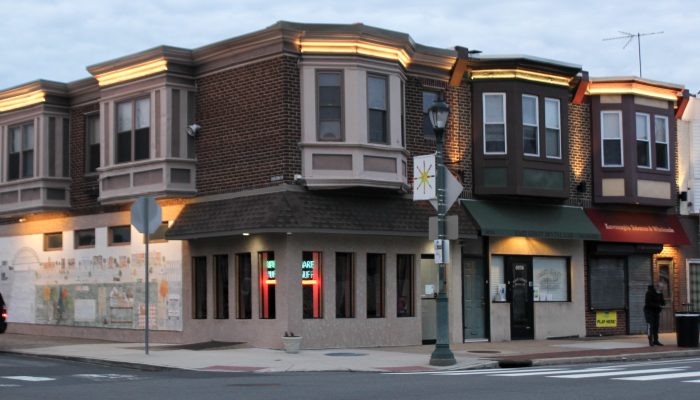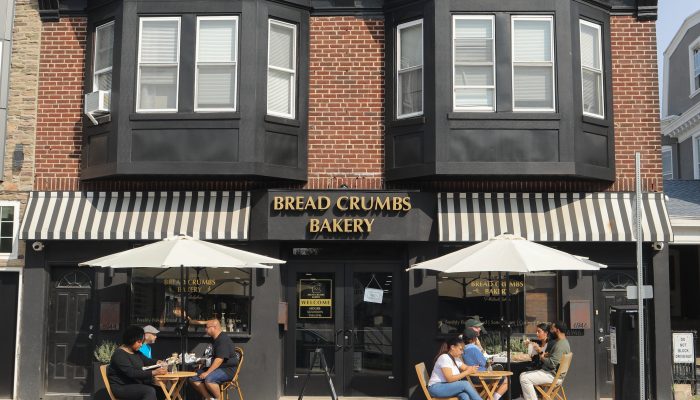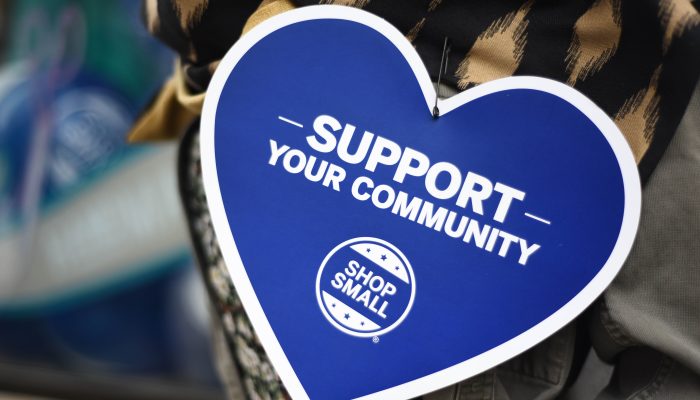For over a decade, the Storefront Improvement Program has helped hundreds of Philadelphia businesses improve their storefronts and shine with eligible improvements. Through the program, we aim to drive equitable neighborhood revitalization that contributes to vibrant commercial corridors citywide where businesses can operate and actualize their dreams. Examples of eligible improvements:
- Masonry/brick pointing
- Exterior painting
- Windows/glazing
- Exterior doors
- Exterior facade lighting
- See-through security grills
- Signage, awnings and more.
The program can reimburse up to 50 percent of the cost of eligible improvements to a maximum of $10,000 for a single commercial property, or up to $15,000 for a multiple-address or corner business property. The Storefront Improvement Program is a program of the Department of Commerce.
Local organizations share their stories
Hear from Xhulio Binjaku (XH), the Director of Tacony Community Development Corporation (CDC), a non-profit located in Northeast Philadelphia about how they help local businesses in the areas that they serve apply for the Storefront Improvement Program:
Tell us about your Community Development Corporation (CDC) and the services you provide to the community.
XH: The Tacony Community Development Corporation (CDC) works to enhance the area’s economic development, urban design, preservation, and environmental initiatives. Founded 20 years ago as a volunteer-led organization, the Tacony CDC has remained committed to revitalizing the neighborhood through events, small-scale development projects, and direct support for local businesses.
We offer various services that attract new businesses, including one-on-one consultations and advocating for business owners to take advantage of programs like the Storefront Improvement Program and other city initiatives that help them grow. In addition to these efforts, we host events along the corridor—such as pop-ups, night markets, promotions, and social media campaigns—encouraging more people to visit and shop. Our long-term projects include historic preservation studies and environmental justice plans that provide lasting benefits to the community.
How many people does your Community Development Corporation (CDC) employ?
XH: Our CDC currently has a small but dedicated team of two staff members: myself as the Executive Director and our fantastic Corridor Manager, Amarynth Ruch.
What does having a CDC in Philadelphia mean to you? What do you enjoy?
XH: Each neighborhood has its specific challenges that CDCs aim to help address. Tacony is a neighborhood with families and history, there is goodwill pouring from everyone, and each person has a story to tell. Tacony CDC as an organization is transforming Torresdale Avenue into Storydale Avenue as part of a collaborative project. We’re collaborating with the artist Mat Tomezsko to collect stories from neighbors and paint those stories on panels that will be on display inside and outside of businesses on the corridor. The neighborhood has a long and grand history of being a utopian factory town from the 1880s, but I like learning about the small oral histories of everyday people too.
How did your CDC assist businesses in applying for the Storefront Improvement Program (SIP)?
XH: We guide businesses through every step of the Storefront Improvement Program (SIP) process, offering personalized support. First, we spread the word about SIP to the Tacony area. Then, we work closely with business owners to navigate the application process, ensuring they understand the program’s full scope. Finally, we assist in managing the project to completion, including helping with financing and other necessary resources.
What do you like about the commercial area where you are located?
XH: What I love about the commercial area is the positive change we are experiencing. More people are showing interest in local food and retail options, and there’s a growing preference for shopping locally rather than traveling outside the neighborhood. This shift is creating a vibrant, community-focused atmosphere where businesses can thrive.
What would you want your customers to know and feel when they enter your CDC?
XH: We’re in the back of the Tacony Music Hall, commonly called the Opera House, which was the music hall for the factory town built in the high Victorian style. It is historically preserved and was meticulously updated by Lou Latrola, who also co-founded the CDC. Come by and enjoy the space.
How has the Storefront Improvement Program impacted the businesses in your neighborhood?
XH: The Storefront Improvement Program has had a significant impact on businesses in our neighborhood. Most of the businesses who’ve done SIP are the ones who end up staying in the neighborhood, and they thrive. This is especially true for retail and restaurants. Improving your storefront can increase your chances of remaining open for longer. A well-designed storefront can greatly increase a business’s chances of long-term success by attracting both new and returning customers. Beyond benefiting individual businesses, these improvements enhance the entire commercial corridor, helping neighboring businesses as well. Programs like this are also a great introduction to other city services for business owners. Completing this program can be a gateway to other impactful projects, opportunities for funding, and a chance to meet the individuals and organizations who are dedicated to ensuring that small businesses do well.

What would you say to a business owner interested in improving their storefronts? What did you learn about the process?
XH: I would say that it’s my job to help you help the neighborhood with your business. The SIP program is a special one, but we also help with other programs including the Business Security Camera Program, InStore Forgivable Loan Program, marketing, permits and more. We learned that each business is on a journey, so we meet each business where they are and help them where they want to go.
Why do you think it is important to improve storefronts?
XH: The storefront is a business owner’s chance to leave a positive first impression on customers. It’s the invitation to come in and see what you have to offer, and also a reflection of the rest of the business corridor. Our design guidelines and standards are key to having a successful and beautiful storefront. For example, brick should never be painted, preserve as much detail as we can, and windows should always be free from clutter to have the best retail viewing experience.
Business owners need to remember that people always shop outside first before they come in to buy a product or service. Design is key. Bread Crumbs Bakery was a success because they understood the design guidelines and we worked closely together to make the facade look so charming! The awnings, the signs, and the lighting make a big difference.
What impact does the program have on your business corridor? What difference(s) have you seen since the improvements have been finalized?
XH: The Storefront Improvement program is one of the most important programs that can help a business improve the look and feel of our commercial corridor. It removes barriers that prevent business owners from creating the look that they want for their location, and it creates an inviting atmosphere for the entire street. When neighbors see a project complete, they get excited to visit that store and support it. We’ve also noticed that when other business owners see a successful project and hear how much support they can get for it, it encourages them to make steps towards improving their own location. One successful project can build momentum for an entire block, which in turn will positively impact the economic vitality of the entire neighborhood.
What advice would you give to a business owner interested in the SIP? What did you learn about the process?
XH: I have two pieces of advice. First, while the process might seem overwhelming at the beginning, you’ll only need to provide some key information, like your commercial activity license and EIN. If you don’t have everything right away, don’t worry—your local CDC and Commerce representatives are here to guide you and help you gather what’s needed. We’re here to support you every step of the way and help your business thrive! Second, understanding the guidelines is beneficial and important. One of the biggest successes for Bread Crumbs Bakery as an example is that they understood the design guidelines and worked with the Tacony CDC to design their façade. There are some things, like see-through security grates or specific color choices, that can seem like a lot of unnecessary detail, but these design guidelines are based on best practices that will attract people to your business and protect your safety.

Why do you think improving storefronts is important for the community?
XH: It creates a positive cycle. I’ve seen people stop their cars, hop off their bikes, or just pause as they walk by to take a look at something new on the corridor. They’ll say out loud, “Wow, this is great. I wish more things like this happened.” That’s exactly what we want, to make people feel proud of their neighborhood. When they see real improvements happening, it changes their perspective. In many Philadelphia neighborhoods, there’s been a lot of disinvestments over the years. But projects like this are a sign of real investment. It gives people hope, and it shows what good things can happen when we put resources into our communities.
Is there anything else you’d like to share about your experience with the SIP?
XH: The Experience with the Department of Commerce and the SIP Manager has been wonderful. We see the Department of Commerce as a key partner, and we couldn’t do it without them.
Interested in improving your storefront?
Yours could be next! We’re here to assist. The Mayor’s Business Action Team (MBAT) in the Department of Commerce is a concierge service providing personalized assistance in multiple languages to business owners or all aspects of doing business in Philadelphia.
Business Services Managers are City liaisons providing entrepreneurs access to information through in-person outreach and customized virtual services. Contact us by emailing business@phila.gov or calling 215-683-2100.




